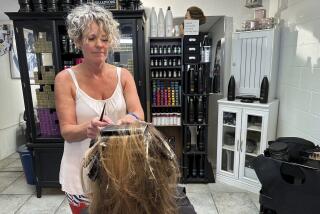Court Asked to Order Nail Salon to Serve AIDS Victim
- Share via
The attorney for an AIDS patient who was refused service by a West Hollywood nail salon has asked a Superior Court judge to prohibit the salon from discriminating against victims of the disease.
Attorney Gloria Allred this week requested that Judge David M. Rothman order the owner of Jessica’s Nail Clinic to immediately provide her client, Paul Jasperson, with pedicure service. Jasperson, who was diagnosed as having AIDS last year, contends that Jessica’s staff refused to give him a pedicure last July after learning he had the disease.
“What we’re really dealing with here is AIDS hysteria,” said Allred in final arguments during a hearing on her request for a preliminary injunction.
Jasperson sued the salon in January, a month after the city of West Hollywood charged the salon’s owner, Jessica Vartoughian, with criminal violations of its AIDS anti-discrimination law. The city’s law was designed to discourage businesses from denying employment, housing and commercial services to people with acquired immune deficiency syndrome.
In addition to his request for the civil injunction against the salon, Jasperson is also seeking unspecified damages. Both the criminal case and the civil lawsuit are unresolved, but Rothman said Tuesday that he would decide on Jasperson’s request for an injunction within two weeks.
Jasperson has said that his pedicure appointment was canceled after a manicurist overheard him talking to a friend about his diagnosis. He has claimed that subsequent attempts to reschedule the appointment were turned down by Jessica’s staff, and later by Vartoughian herself.
In her arguments, Allred said Jasperson was denied a pedicure despite mounting medical evidence that casts doubt on the likelihood that AIDS could be transmitted to a salon worker or another salon client. The salon’s attorney has claimed that workers and clients could be exposed to blood contamination from accidental cuts caused by scissors and other sharp instruments.
“There are many things they (the salon staff) could do to minimize the chance of exposure,” Allred said. “Instruments can be disposed of or sterilized. And workers with any open cuts or lesions should refrain from contact with any clients, not just AIDS patients.”
Allred added that even if the salon’s arguments are upheld, the staff might unknowingly provide services to AIDS patients who, unlike Jasperson, do not disclose the fact that they have the disease.
“The risk is still there,” she said. “Wouldn’t it be better if an AIDS patient could walk in without fear of discrimination and tell the workers so that they could take the necessary precautions? Otherwise, pedicurists will still perform pedicures on people with AIDS, but they won’t know it and won’t be taking any precautions.”
Paul Geragos, the salon’s attorney, belittled Allred’s claim that medical evidence overwhelmingly shows that the chances of the salon staff contracting AIDS from a customer are remote.
“We’re still in the learning stages,” Geragos said. “There is no evidence that definitively tells us how this disease is transmitted.”
Because there is no such conclusive evidence on transmission, Geragos said, the salon’s owners are justified in denying service to AIDS patients.
Geragos blamed the West Hollywood City Council and the state Board of Cosmetology for failing to provide explicit steps for businesses to follow to prevent transmission of AIDS.
“It’s the fault of the legislatures (state and West Hollywood City Council) which make this an issue of civil rights instead of one of health and public safety,” Geragos said.
More to Read
Sign up for Essential California
The most important California stories and recommendations in your inbox every morning.
You may occasionally receive promotional content from the Los Angeles Times.










